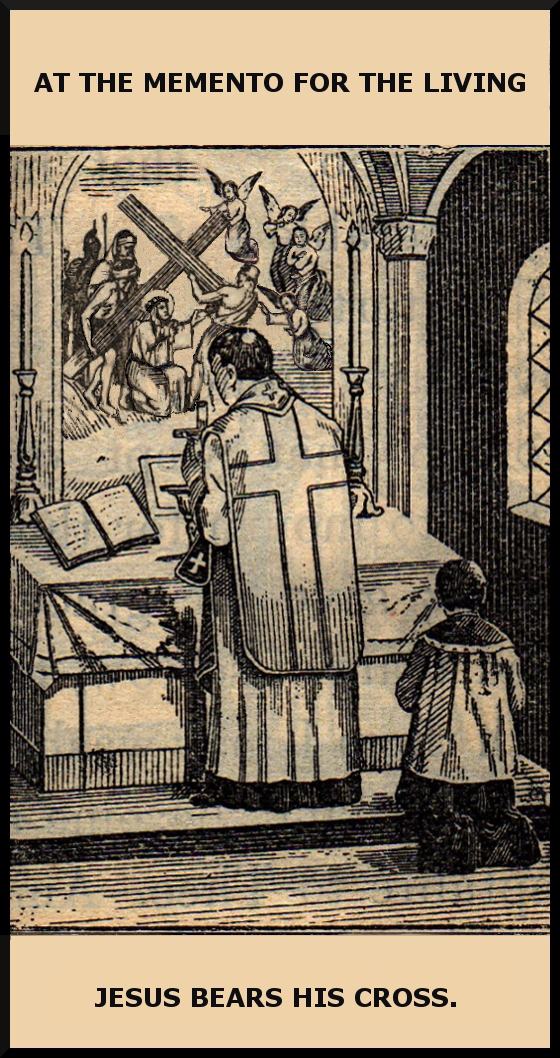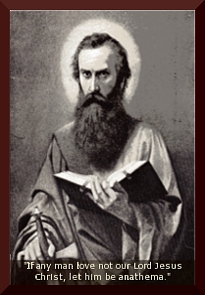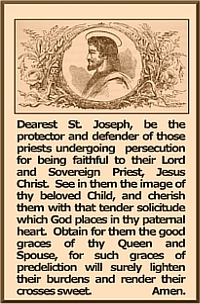“I saw angels come to His assistance, otherwise He would have been unable even to raise it from the ground.” – Bl. Anne C. Emmerich
In the Memento, Domine, the Church’s public prayer is explicitly for all of the faithful, all those of the household of the faith whose “faith and devotion are known” to God. Being faithful and devoted means to willingly pick up one’s cross and follow our Savior. For most, this simply amounts to the fulfillment of daily duty accomplished with a cheerful heart, embracing even its hardships and sorrows.
Suffering is naturally repulsive to human nature, but we need not fear since God’s angels are always ready to assist us. God never asks what cannot be accomplished. Gihr tells us that, “sentiments of faith and devotion are awakened and nourished in proportion to the lively interest taken in the celebration at the altar.”
The priest prays “tibique reddunt vota sua” for those paying their vows to the eternal God. At Baptism the faithful solemnly vowed to renounce sin, to die to the world, and to live solely for God. At the Holy Sacrifice of the Mass, the faithful “pay” these vows to the degree that they unite with the priest in offering not only the Eucharistic Victim, but in union with Him, they offer themselves in body and soul along with all labors, trials, sufferings, joys. The more perfect the offering of self, the more disposed one will be to receive of the treasury of Graces from the Mass – bountiful gifts, both temporal and spiritual.
Prayer: “Lord Jesus Christ, who for me didst bear on Thy own shoulders, Thy cross; make me ardently embrace the cross of mortification through dying to self, and for Thy love, to bear it daily after Thee. Amen.”
The Mass is most efficacious for those who are connected to the Sacrifice. Therefore, it behooves us to be magnanimous of heart, and to, at this moment, make supplication for all living family members, those whom we love, those who are in need of prayers, those who have recommended themselves to our prayers; yes, even those who have offended us.
+++++++++++
As can be seen, the TLM already has a place for intercessory prayer in the Memento Domine. There is no need for “bidding prayers”. The “Prayers of the Faithful” that are formulated into the N.O., is an idea borrowed from Protestants. The “petitions” are often no more than expressed agendas, rambling sentimentality, opinions and politics masquerading as prayers to God.
Furthermore, the Memento for the Living in the N.O. is deficient and inferior to that of the TLM. In the TLM, the petition “pro spe salutis et incolumnitatis sua” – “the hope of their salvation and safety”, expresses the desire for an eternal and supernatural good, as well as temporal blessings. Gihr states that in the word “salus”, all spiritual and supernatural gifts are comprised, while the word “incolumitas”, designates temporal blessings of the natural order which include health and success in undertakings – if they are not a hindrance to our salvation.
In the N.O., the line (“pro spe salutis et incolumnitatis sua”) is translated as “hope of health and well-being”, thus requesting of God only a natural good.
Also, in the N.O., the expression “paying homage” is used instead of “pay vows”. To pay homage to God is not the same thing as to pay Him our vows.




